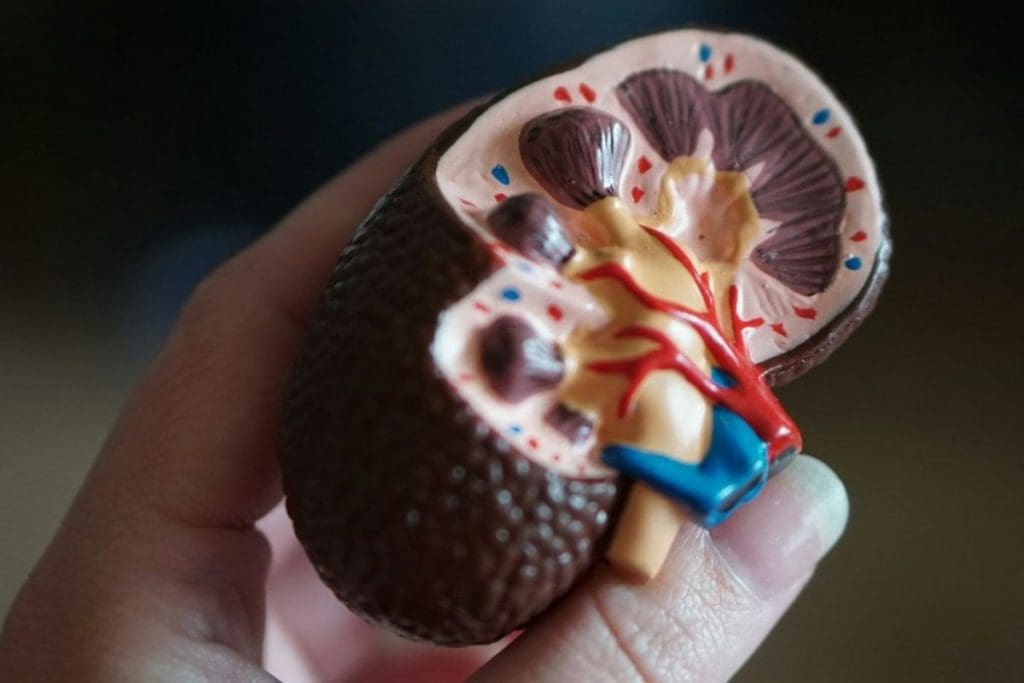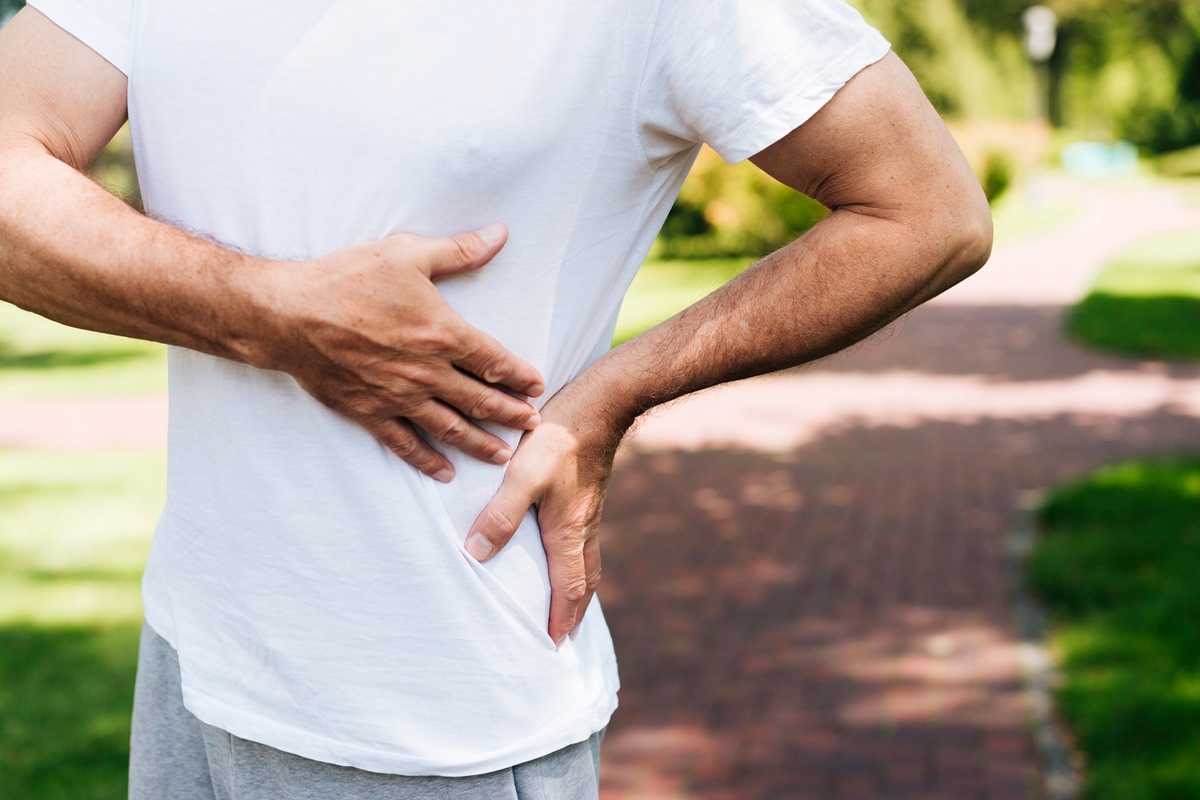Last Updated on November 25, 2025 by
Did you know your DNA might hold clues about your risk for kidney stones? Recent studies show how much your family history can influence your chance of getting this painful condition. We’re discovering more about the genetic connection to nephrolithiasis, a common problem worldwide.

Research shows that about 50% of the risk comes from your genes. Over 70 genetic spots have been linked to a higher risk. This knowledge is key to understanding why some people are more likely to get kidney stones.
Kidney stones are hard deposits made of minerals and salts. They form inside the kidneys. Their occurrence is becoming more common. These stones can be made of calcium oxalate, uric acid, cystine, or struvite. Each type has different causes and treatment options.
Kidney stones, also known as nephrolithiasis, vary in size and composition. The most common type is the calcium oxalate stone. It’s often linked to diet and genetics. Knowing the type of stone is key to finding the right treatment and prevention.

The symptoms of kidney stones can be very painful. You might feel severe pain in your back or side. This pain can move to your lower abdomen or groin. You might also feel nausea, vomiting, and see hematuria (blood in the urine).
If not treated, kidney stones can cause more problems. These include urinary tract infections or kidney damage.
The formation of kidney stones is complex. It involves the concentration of minerals in the urine. Dehydration, dietary habits, and genetic predisposition are key factors. When urine is too concentrated, minerals can crystallize and form stones.
Understanding these basics is key. It helps us see how genetics play a role in kidney stone development. We’ll dive deeper into this in the next sections.
Kidney stones often appear in families, showing a strong genetic link. Researchers are studying this to learn how genes increase the risk of stones.
Research shows that about 50% of the risk for kidney stones comes from genes. This is important for those with a family history of stones.
Genes play a big role in many diseases, including kidney stones. The genes involved interact with the environment in complex ways.
People related to someone with kidney stones face a doubled risk of getting stones. This highlights the role of genetics in the disease.
Those with a family history of stones should watch their diet and drink plenty of water. This can help lower their risk.
Family and twin studies confirm the genetic link to kidney stones. These studies show a clear genetic component.
Twin studies have also shed light on the genetic risk. They compare the stone incidence in identical and fraternal twins to estimate heritability.
Genetic research has found specific genes linked to a higher risk of kidney stones. Knowing these genes can aid in preventing and treating kidney stones. We will look at the main genes and their roles in stone formation.
The SLC34A1 gene is key in regulating phosphate in the kidneys. Mutations in this gene can cause abnormal phosphate reabsorption.
Studies show that people with SLC34A1 mutations are more likely to get kidney stones. This is due to the phosphate imbalance it causes.
The TRPV5 gene is vital for calcium reabsorption in the kidney. Variants of this gene can affect calcium handling. This can lead to calcium stones.
Research shows that changes in TRPV5 can greatly increase a person’s risk of kidney stones.
CYP24A1 is involved in vitamin D metabolism, affecting calcium absorption. Mutations in this gene can cause high levels of active vitamin D. This can lead to increased calcium absorption and kidney stone formation.
Besides SLC34A1, TRPV5, and CYP24A1, other genes also play a role in kidney stone risk. These genes are involved in mineral handling and stone formation. They include:
Kidney stones can come from single genes or many genes. Knowing the genetic causes helps find at-risk people and prevent stones.
Research found 46 genes linked to kidney stones. These genes are key in how our body absorbs minerals. A single gene change can cause stones.
For example, a SLC34A1 gene mutation affects phosphate, raising stone risk. TRPV5 and CYP24A1 genes play roles in calcium and vitamin D, also affecting stone risk.
People with a family history of stones are more likely to get them. Polygenic risk affects how our body handles minerals like calcium and oxalate.
Genes that manage calcium and phosphate can change urine mineral levels. An imbalance can cause stones. Knowing these genes helps in making prevention plans for each person.
Genetic testing is now a key tool for finding out if you might get kidney stones. It helps spot genes linked to these painful stones. This lets people take steps to lower their risk.
New genetic screening tools have changed how we prevent kidney stones. Next-generation sequencing lets us check many genes at once. This gives a full picture of your risk for kidney stone disease.
Modern screening has many benefits:
Genetic testing is a good idea for people with a family history of kidney stones. It’s also for those who keep getting stones. If you have conditions like hyperparathyroidism or cystinuria, testing can help understand your risk.
At Liv Hospital, we use the latest genetic screening to help those at risk.Our team uses advanced testing to find risk factors. We then create plans to help you manage your kidney health.
Our genetic screening includes:
Genetics are important in kidney stone formation, but other factors matter too. Knowing these factors helps us understand the risk better.
More so if we have a genetic risk. Some foods can lead to stone formation by changing mineral levels in our body.
When we drink enough, our body can clear out minerals that might form stones.
Tips for good hydration habits:
Some health issues can make kidney stones more likely, even if you have a genetic risk.
“Some medical conditions can significantly increase the risk of developing kidney stones, even with genetic factors.”
People with a family history of kidney stones can lower their risk. By using specific prevention strategies, they can fight against their genetic risk. It’s all about making the right choices.
A personalized diet plan is key for those at risk. Knowing your genetic makeup helps us spot dietary dangers. For example, if you’re prone to calcium oxalate stones, we suggest a low-oxalate diet.
Drinking enough water is also vital. It helps prevent minerals from concentrating and forming stones. We create a tailored hydration plan based on your lifestyle and genetic risk.
For those at high risk, medication options are important. We look at drugs that manage conditions leading to stones. This includes diuretics to lower calcium in urine or potassium citrate to prevent certain stones.
Choosing the right medication is a team effort. We work with your healthcare provider to find the best fit for you.
Lifestyle modifications can greatly reduce kidney stone risk. We suggest staying at a healthy weight and exercising regularly. These habits improve your metabolic health.
Also, cutting down on salt and animal protein helps. We guide you on how to make these changes.
By combining diet plans, medications, and lifestyle changes, you can lower your risk. It’s a proactive way to manage your genetic risk.
We’ve seen how genes can lead to kidney stone disease. It’s vital to manage genetic risk to stop kidney stones from forming.
Identifying genes that raise kidney stone risk and how they work with the environment is important. This knowledge helps people take steps to prevent kidney stones. Personalized diets, medications, and lifestyle changes can lower genetic risk.
At Liv Hospital, we stress the need for detailed genetic screening and advice. This helps people understand and manage their genetic risk. By using genetic information and prevention strategies, we can cut down on kidney stone cases and boost health.
It’s essential to manage genetic risk to prevent kidney stones. By being proactive and informed, people can reduce their risk. This keeps their kidneys healthy.
Kidney stones are hard deposits made of minerals and salts. They form inside the kidneys. This happens when there’s an imbalance of water, salts, and other substances in the urine.When this imbalance occurs, minerals crystallize and stick together. This creates kidney stones.
Yes, about 50% of the risk of getting kidney stones is inherited. If your family has a history of kidney stones, you’re more likely to get them too.
Symptoms include severe pain in the side or back, below the ribs. Pain can also spread to the lower abdomen or groin.Other symptoms are nausea, vomiting, and painful urination.
Yes, genetic testing can spot those at risk of kidney stones. New screening technologies can find genetic mutations that raise the risk.
Non-genetic factors include dietary triggers and hydration habits. A diet rich in animal protein, sodium, and sugar can increase the risk.
To prevent stones, follow a personalized diet plan and stay hydrated. Lifestyle changes and medications can also help.
Hydration is key in preventing kidney stones. Drinking enough water dilutes the urine. This reduces mineral concentration that can form stones.
Yes, lifestyle changes can help manage genetic risk. Eating healthy, staying hydrated, and managing medical conditions can reduce the risk of kidney stones.
Subscribe to our e-newsletter to stay informed about the latest innovations in the world of health and exclusive offers!